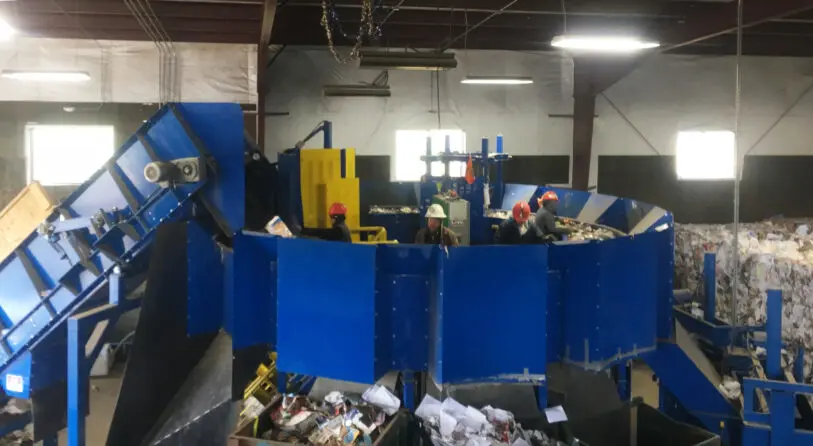Only around half of Americans have easy access to curbside recycling. For some others, recycling might mean bringing old bottles and boxes to an inconvenient drop-off site—and for still others, there may be no recycling options at all. In many rural communities, even if they wanted access to recycling, it would be a financial challenge to build recycling infrastructure: a new center for sorting out recyclables can cost as much as $30 million. And trucking items off to a distant recycling center is both expensive and has a large carbon footprint, pretty much negating the positive impact of recycling in the first place.
A new program aims to build smaller local facilities instead, with a cost per facility of around $1.5 million. Backed by $35 million in new funding from PepsiCo, the program, called the Closed Loop Local Recycling Fund, will work to install mini recycling facilities in “recycling deserts” around the country. “We know that there are major swaths of the country that just really don’t have recycling in a way that people are willing to use,” says Bridget Croke, managing director at Closed Loop Partners, a circular economy investment firm that is managing the initiative. It’s especially problematic in states like Texas where populations are quickly growing, but recycling infrastructure hasn’t kept up.
While a large MRF (or, material recycling facility) might rely more heavily on technology that can automatically sort materials, the mini-MRF design—around four to five times smaller—is simpler, too, with a small circular conveyor belt that brings the recyclables past workers who manually sort them into bales. (The conveyor belt brings items around multiple times, a little like a baggage carousel at an airport, so that if things are missed on the first go-round, they can be caught on a subsequent round or two.) The modular design, from a company called Revolution Systems, can grow if a community has more demand over time. The manual process is expected to help yield higher-quality, better-sorted recyclable materials like plastic, adding to the supply of material that companies like PepsiCo can use as they incorporate more recycled content into their packaging.

“We need to unlock new supplies of recycled plastics for our portfolio, and we think Closed Loop is the right partner to do that with,” says Jason Blake, chief sustainability officer and senior vice president at PepsiCo Beverages North America. The company aims to cut the use of virgin plastic in half across its global food-and-beverage portfolio by 2030. (Some brands are moving faster in certain markets—in several European countries, some Pepsi products will be sold in 100% recycled plastic beginning this year.)
Having a supply of enough recycled plastic is a challenge for beverage companies as many ramp up their goals to buy new recycled material while others are adding to the demand—including brands making products like shoes from recycled plastic bottles, or cities paving roads with the material. “If you look at the 2025 goals that companies are making, there’s just not enough material for them all to be able to achieve those goals,” says Croke.
Through the new program, PepsiCo will also buy directly from the recycling facilities. “It creates a more secure market for the longer term, which is something that we’re always talking about in recycling,” she says. Longer-term contracts can help guarantee a more consistent price for recycled plastic, which has jumped up and down in value.
Many environmental advocates argue that recycling alone isn’t a solution. “Beverage companies should be focusing on shifting away from single-use plastic to refillable purchases,” says John Hocevar, a campaign director at Greenpeace. “We are still seeing most companies focusing too much on recycling, even though very little plastic is recycled at all, and almost none is recycled more than once. For plastic, recycling is just a brief pause between fracking on one end and being dumped or burned on the other.”
Even in communities in the U.S. that have easy access to recycling means, recycling rates are still relatively low. Overall, in 2021, only around a third of the plastic bottles sold in the U.S. were actually recycled; and because the volumes produced are enormous, so, too, the vast amount of plastic bottles that end up in landfills. “Coca-Cola alone produces about 110 billion plastic bottles each year,” Hocevar says. “It’s hard to believe that there is anyone at this stage who sees that as sustainable.”
PepsiCo, like its competitors, has added some refillable products; the company owns SodaStream, and last year, stopped selling its bubly sparkling water brand in plastic bottles, using the SodaStream platform instead. Still, the vast majority of its products are in single-use packaging. It’s not inevitable—soda companies did use refillable packaging before the 1970s—but systems would have to change more broadly to make that possible again.
Croke says that Closed Loop Partners is pushing brands to move to reusable packaging, but “single use is highly unlikely to fully go away in the next 10 years,” so strengthening recycling infrastructure is critical.
Recognize your brand’s excellence by applying to this year’s Brands That Matter Awards before the early-rate deadline, May 3.
